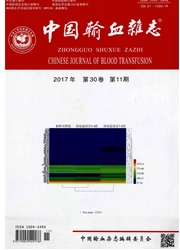

 中文摘要:
中文摘要:
目的分析造血干细胞移植(HSCT)后复发与个体差异的细胞因子高表达的关系。方法分别采集24名异基因造血干细胞移植(allo-HSCT)患者移植前后(-13、0、7、14、21、26和30 d)的系列血样,4名健康人作为对照采集血样周期同患者,分别制备血浆、DNA、RNA;血浆用于细胞因子GM-CSF、IFN-γ、IL-1β、IL-2、IL-4、IL-5、IL-6、IL-8、IL-10及TNF-α检测;DNA用于信息STR位点谱定量分析嵌合物;RNA用于定量检测BCR-ABL融合基因的肿瘤负载。结果信息STR位点谱定量分析嵌合物结合BCR-ABL融合基因的肿瘤负载,确认出4名患者为慢性粒细胞性白血病复发,另有1人根据临床表现诊断为急性粒细胞性白血病复发,1人死于急性移植物抗宿主病。对5名复发患者、18名缓解患者移植前后10种细胞因子浓度(pg/ml)分析发现:复发组与缓解组分别为GM-CSF(57.2±135.8)vs(15.7±37.3)、IL-1β(233.0±330.6)vs(19.2±39.5)、IL-2(178.2±257.0)vs(14.1±41.1)、TNF-α(9.0±18.4)vs(2.6±4.3)、IL-4(28.9±33.5)vs(9.9±10.0),P〈0.01),此差异主要是由于5名复发患者中的2例持续高表达IL-1β、IL-2、IL-4,而TNF-α、GM-CSF仅在1例中持续高表达,缓解组18例加上死亡的1例共19例中只有1例GM-CSF持续较高表达。结论 HSCT移植后的复发可能与个体差异的细胞因子高表达相关,且这些细胞因子为成组出现,如IL-1β、IL-2、IL-4同时高表达。建议allo-HSCT患者在移植前后做细胞因子的浓度测定,至少包括IL-1β、IL-2、IL-4。
 英文摘要:
英文摘要:
Objective To explore the association between relapse and high expression of cytokines after allogeneic hematopoietic stem cell transplantation(HSCT).Methods Blood was drawn from 24 patients undergone HSCT and 4 healthy unrelated persons,at transplantation days of-13,0,7,14,21,26,30,and plasma,DNA and RNA were prepared.Plasma samples were used to analyze cytokines including GM-CSF,IFN-γ,IL-1β,IL-2,IL-4,IL-5,IL-6,IL-8,IL-10,and TNF-α,using a ten-plex antibody bead kit,DNA was used to analyze quantitative chimera and RNA was used for BCR-ABL transcript analysis to confirm relapse of clinically suspected patients.Results Through quantitative chimerism and BCR-ABL transcripts analyses,4 patients were confirmed in CML relapse,one was diagnosed as AML relapse by clinical signs.Another patient died of severe acute graft versus host disease.The cytokine concentrations in relapse(5) versus remission(18) were(57.18±135.8) and(15.7±37.3) respectively for GM-CSF,(233.0±330.6) and(19.2±39.5),respectively for IL-1β,(178.2±257.0) and(14.1±41.1),respectively for IL-2,(9.0±18.4)and(2.6±4.3)respectively for TNF-α,and(28.9±33.0)and(9.9±10.0) respectively(pg/ml,P〈0.01)for IL-4.Further observations showed these concentration differences were caused by 2 of 5 relapsed patients,who suffered from sustained high expression of a group of cytokines including IL-1β、IL-2、IL-4.While only one of 19(18 remission plus 1 deceased) was found to have high expression of GM-CSF in non-relapse.Conclusion The relapses after HSCT is possibly related to high expressions of cytokines including IL-1β,IL-2,and IL-4,which were caused by individual differences.It is suggested that cytokine quantitative analysis should be performed on patients underging HSCT,at least including IL-1β,IL-2,and IL-4.
 同期刊论文项目
同期刊论文项目
 同项目期刊论文
同项目期刊论文
 期刊信息
期刊信息
